The Fire of 1878 in Potton
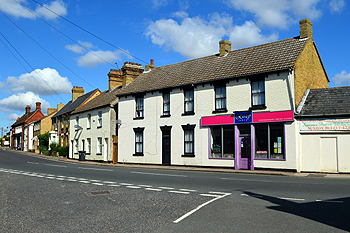
North side of Blackbird Street August 2013
The Great Fire of Potton of 1783 is well known. It did great damage to the town. In June 1878 another large fire engulfed the town. The Bedfordshire Mercury of 29th June reported it as follows.
"By far the worst fire that has happened in the entire county of Bedford within living memory occurred on Wednesday last [26th June] in this town. Soon after ten o'clock on the day named it was noticed that smoke was issuing from a barn on premises occupied by Thomas Abbott. His dwelling house is situated on the left hand side of Blackbird-street entering the town from the station, and the barn was about thirty yards in its rear; it contained a large quantity of straw, which, with already overheated roof, lent additional aid to the flames. An alarm was quickly raised, and in all directions the inhabitants were astir for the cry of "Fire" in Potton has ever proved itself of a terrible and alarming nature. In 1783 the greater part of the town which up to then had maintained a good market, was destroyed by fire, and since that time on several occasions has this awful visitant scared the townsfolk. A curious superstition of this part of the country, in common with much a larger area was verified by this fire.It is commonly believed that if a hare runs through the streets of a town a fire is sure to follow, and certain it is that on Tuesday last a hare did run through Potton and it was certainly followed by a terrible fire. many of the inhabitants were really alarmed by the unwelcome appearance of "Poor Puss" and seemed to take the dread news of Wednesday as the naturally expected result. Guided probably by the remembrance of former fires all set to work to remove household property , and in a very short time the streets were literally filled with beds, beddings, bedsteads, chairs, tables, crockery, pictures, ornaments and every description of furniture. Meanwhile the devourer was progressing, and soon a piece of fire flew over the threatened block to the corner of Bull-street, thus making confusion worse confounded, and throwing additional terror into a previously safe district. The fire engines were quickly got out and Mr. Walker, surgeon [of 9 King Street], captain of the newly-formed Volunteer Fire Brigade, ably directed the efforts of his men: the large engine was placed as near the scene of the fire as possible, in the yard of John Fane, butcher: but as that individual positively refused to allow the water from his pump to be used, and moreover removed the sucker to ensure his word being obeyed, it was necessary to remove the engine to another spot, which was not, however, nearly so advantageous. To us it seems almost beyond comprehension that anyone could so assist the destruction of his neighbour's property, but that this was the result of Fane's conduct is clearly manifest. At the start of the fire a few buckets of water woudl probably have extinguished it; and when it had gone beyond that a prompt supply from the fire-engine would no doubt have soon arrested the flames, and saved a great portion of the property that is now destroyed".
"Mr. Walker, who throughout the whole day was ably assisted by Sir John Burgoyne, however, lost no time in vain regrets, and seeing that the fire was extending beyond the power of his brigade to cope with it, he, after consultation with Sir John, telegraphed to Biggleswade for that brigade with a good length of hose. On receipt of the telegram Sergeant Vincent laid it before Superintendent Bedlow, who at once summoned the brigade, and in a quarter of an hour the engine felt the town mounted by Foremen Spong and White, and four brigadiers, together with Mr. A. Hill of the Bedford Brigade, who had been attending the Biggleswade Sessions [Captain Augustus Hill was later head of the Bedford Volunteer Fire Brigade, he was also co-proprietor of the Bedfordshire Mercury!]. The journey to Potton was quickly run, and on reaching the town Mr. Walker directed the engine to the brook at the outside of the town, whence, throughout the day a continuous supply of water was pumped through over a quarter of a mile of hose up to the Potton No. 1, and later on to the Bedford engine. The smaller Potton engine was sent to the fire in Bull-street, where under the guidance of Mr. George King [brazier of Blackbird Street], it was confined to its original bounds".
"In consequence of the large area of ground covered by the burning buildings it was a matter of great difficulty to know where to begin work, but while Mr. Walker was superintending the operations in Blackbird-street, with a view to prevent its extension towards Post Office street [Chapel Street], Mr. Hill directed the pulling down of a barn and a slaughter house at the rear of John Fane's house [no doubt with some satisfaction] and the result showed the wisdom of the step, for, with the exception of scorching the end of a barn which adjoined that pulled down at right-angles, the fire did not spread a single foot beyond the gap thus made".
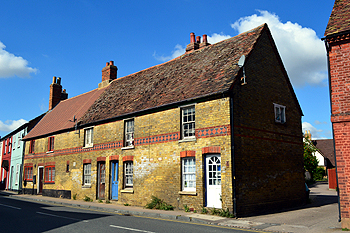
14 to 20 Sun Street August 2013
"The next thing was, if possible, to save a few of the houses in Sun-street nearest to Mill-lane [Horne Lane] but on the opposite side of the road, and it is gratifying to be able to state that after several hours of ceaseless, hard, and very hazardous work three cottages nearest to Fane's were quite saved, as was the beershop of Henry Parkin [the Gardeners Arms, 20 Sun Street], with the exception of a few feet of tiling which were removed as a matter of precaution. About half-past twelve a consultation took place between the representatives of the different brigades, which resulted in Sir John Burgoyne telegraphing for the Bedford brigade to come with plenty of hose with all speed. The telegram reached Captain Thody at five minutes past one, and at 1.25 the engine drawn by a magnificent team of four horses crossed from the Swan Hotel, crossed the bridge [i.e. Bedford Bridge] for Potton. At half-past two the engine was in Potton, and the horses looked in really fine condition then. Captain Thody was shown the extent of the fire and, by the time he had seen it, Foreman Banks, with the assistance of Engineer Ball had placed the engine with a good supply of pumpers ready for work; and in a few minutes after their arrival the Bedford brigade with their powerful engine were throwing a tremendous force of water on to the fire. In the meantime the Sandy engine with a number of helpers had arrived, but from the first a feeling of jealousy of the other engines, with properly organized brigades was manifested, and after several fruitless appeals, it was decided to displace them, and allow the Biggleswade engine to supply both the Potton and Bedford engines. In the course of the afternoon, about four o'clock, Mr. Harvey of Ickwell sent over his engine and a numebr of men, buy on arriving, they found all danger of extension at an end, the flames being rapidly got under".
"For five hours all the engines worked constantly, the firemen likewise, and by eight o'clock it was evident that all danger was at an end, or nearly so. Several accidents, fortunately not severe, occurred, but there were narrow escapes. The first was in the removal of Fane's slaughter-house, when Brigadier Taylor of the Biggleswade team was precipitated from the roof to the ground, a distance of nearly fifteen feet; beyond a severe shaking he was not hurt. Later on Brigadier Allen, of the Bedford team, had a very narrow escape of being killed on the spot. He, with Brigadiers Baker and Town, was at work in Sun-street when a heavy coping and iron-spouting fell on his helmet, a distance of full 15 feet, knocking him over and deeply indenting his helmet, which alone saved his skull. Another accident happened to a Potton lad, whose name we did not learn; he was engaged in assisting to pull down some buildings when an iron spike ran into his leg and made a bad wound. He was promptly attended to by Mr. Walker, and is, we hear, not very severely injured".
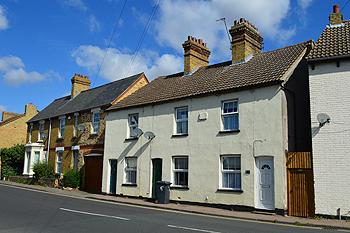
4 to 14 Blackbird Street August 2013 - all post 1878 properties
"An idea of the destruction may be gained from the following facts: - The fire started in Abbott's barn, and extended on the right to cottages occupied by Lester, Richardson, Amey, Westrop, Dalby, all the way to the corner of Blackbird-street. On in a continuous line in Sun-street it took a cottage occupied by Mrs. Barringer, the Queen's Head public-house, occupied by Joseph Shearman; all the back premises of the beerhouse kept by Henry Parkin [the Gardeners Arms], and the slaughter-house and barns of John Fane, with part of those of John Paul, which ran up to the Independent Chapel [in Sun Street]. To the left of Abbott's the fire consumed a house occupied by Charter, the Barley Mow beershop, and all the back premises of the same, also some hovels and barns, and an old cottage that was formerly the post-office, but which was fortunately unoccupied. At the corner of Bull-street there were destroyed two cottages the property of Mr. Charles Edwards of East Hatley, Cambridgeshire, and this was where the Potton No. 2 engine was placed. The greater part of the property was insured, chiefly in the Sun, County and Norwich Union offices; but the property destroyed, although it covers an area of very nearly three acres, was not of the most valuable class, being largely composed of thatch roofed cottages and outbuildings, though of course many of the larger ones facing the streets were fairly good brick and tiled or slated dwellings. The loss will probably amount to some three or four thousand pounds".
"We have already mentioned Sir John Burgoyne; it is only just to say that the gentleman was as active as any in watching the progress of the fire, and endeavouring by the best means to encourage and assist the firemen. The police were represented by Major Warner, Chief-constable of Bedfordshire, Superintendent Bedlow, Biggleswade; Sergeants Vincent and Daniels, the Police-constables Newton, Bates and Little of the Beds force; while Inspector Carlow from Caxton, Sergeant Grigg and Police-constable Jones from Gamlingay, were present and assisted on behalf of the Cambridgeshire force".
"The Bedford brigade left Potton for home soon after eight and were eagerly welcomed by a large crowd of persons at the engine house. On arrival there they were highly gratified at seeing the following telegram, which had been despatched by Sir John Burgoyne to Inspector Haynes -"
"Potton 4.50 p.m.
"Have got fire under: about sixteen house and large outbuildings destroyed. Bedford engine has done good service".
"This is significant indication of the magnitude of the fire and of the services rendered by the fire-brigades. Great praise is due to Captain Walker, Mr. Raynes [Henry Raynes of 22 King Street], Mr. W. J. Arnold [Walter James Arnold, surveyor, of Bull Street] and Mr. Guest [Arthur Guest, draper, of the Market Square] of the Potton brigade for their persistent labours throughout the day, and we trust that while hoping they may not be wanted again for many years, they will soon be consolidated and drilled into shape, for the brigade includes some excellent workable material".
"Throughout the night of Wednesday the Biggleswade and Potton engines with a number of firemen under Foreman Spong, remained at the scene of the fire, but fortunately their services were not required beyond giving an occasional dose of water to subdue persistent bodies of fire. Captain Millar, of the Biggleswade Brigade, came over on Wednesday night and kindly relieved Mr. Foreman Spong".
"During Thursday the engines were kept in readiness on the scene, there being still a large mass of smouldering debris. The greatest possible indignation prevails throughout the parish with regard to the conduct of Mr. Fane who, on Wednesday night, would have undoubtedly suffered violence from the crowd if the Brigade had not been stationed in front of his house".
"In addition to Sir J. M. Burgoyne, Bart., there were also on the scene during the fire Mr. J. N. Foster, Colonel Kindsell and Captain Barnett. Sir John, as president of the newly-formed local Brigade, did everything in his power to forward their work; and very valuable aid was given with the Potton No. 2 engine by Mr. Charles Lindsell (son of Mr. C. S. Lindsell of the Holme), who did good work with a branch pipe from the top of a burning building. Mr. Peacock [Charles Peacock of the Green Man], close by had a quantity of benzoline on his premises, and earnestly called for some one to help him remove it, but owing to its proximity to the burning property, his appeal was unheeded until Mr. Lindsell volunteered for the dangerous task, which he effected with the utmost coolness and bravery. Mr. Bingham [Francis Bingham, brewer and cooper of King Street and Hogg Hill], with the small manual engine at their brewery, rendered good service in preventing the spreading of the flames. We cannot praise too highly the services rendered by the Potton Brigade, but one thing was painfully apparent, that they could not exercise authority or do work so methodically as the organized brigades of Bedford and Biggleswade, having no uniform or implements with which to cut away or pull down buildings, - deficiencies which we hope the parishioners will at once set themselves to work to make good, for Captain Walker and his men have proved themselves worthy of every support. It is only right to add that Mr. Race Raynes [William Race Raynes, solicitor of King Street], the secretary, also rendered valuable assistance".
"It is satisfactory to have to state that no loss life, human or otherwise, attended the fire. On Thursday, however, an accident occurred which it was feared would terminate fatally. A heavy iron water cart, belonging to Mr. T. B. Kitchener [Thomas Benbow Kitchener, manufacturer of drills and threshing machines, Moon's Corner] , was brought full of water to a smouldering portion of the ruins, and on the horse being taken out the iron cylinder tilted at the back, throwing the shafts upwards and hurling the driver, named Kitchener, a considerable distance into the debris, where his head came into contact with some charred beams. He was picked up insensible but Captain Walker, surgeon, was in attendance upon him in a few minutes, and the injuries were found not to be so serious as was anticipated".
"During the night of Wednesday the burnt-out people - men, women and children, spent the night by the hedge sides, but there was no sound of lamentation, and some groups kept singing - "Hold the fort" until an advanced hour on Thursday morning. A considerable quantity of their household furniture had been saved from the fire".
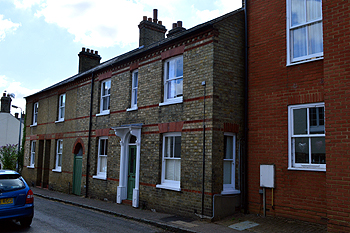
The south side of Bull Street August 2013
"Appended is a list of the occupiers whose premises were totally or partially destroyed: - David [sic] Abbott, market gardener, in whose shed the fire originated; [James] Smith, bricklayer; Brittain, labourer; Dazely, labourer; Darlow, labourer; [Charles] Charter, cooper [Sun Street]; Pigott, Barley Mow, house partially destroyed by falling down, also by water and fire; Lester, labourer; [William] Richardson, shoemaker [Horne Lane]; [William] Amey, tailor [Blackbird Street]; Dalby, cabinet maker; [George] Amey, bootmaker [Sun Street]; Mrs. Roslin, widow; Shearman, Queen's Head, utterly burnt; Henry Parkin, Gardeners Arms, partially destroyed; Mrs. Seamer, widow; Stonebridge, labourer; Earl, labourer; also outbuildings of the Woolpack, part of outbuildings of Mr. T. B. Kitchener, outbuildings of Mr. Fane, unoccupied outbuildings of Mr. S. C. Whitbread (of Southill), were destroyed. The area covered by the burnt buildings includes the space lying within Post-office-Street, Moon's Corner, Blackbird Street, Sun Street, and Bull Street, and comprising nearly three acres".
"In happy contrast to the churlish conduct of Mr. Fane in refusing access to his water was the alacrity with which Mr. Richardson, brewer [Henry Richardson of Sun Street], kindly offered his reservoir. This fire affords to the inhabitants of Potton another powerful argument in favour of providing a central reservoir which will be always available in case a similar casualty should occur. The following members of the Bedford and Biggleswade Brigades attended the fire: -"
"Biggleswade Brigade - Foremen Spong and White, Brigadiers Franklin, E. Dodimead, Field, March. Albone. Moffatt, Bomrose, Reynolds, Dodimead, C. Taylor and F. Taylor. The Bedford Brigade was represented by Captain Thody, Foreman Banks, Secretary May, Engineer Ball and Brigadiers Mann, Thody, Coote, Town, Evans, Baker, Potter and Allen. To guard their own town Brigadiers Haynes and Freshwater were left at home in accordance with standing custom of the Bedford Brigade".
"During Thursday night the members of the Potton Brigade were obliged to keep up a careful watch, as the wind fanned into flame the burning embers in various portions of the ruins. The indignation of the populace against Mr. Fane, the butcher, is great, and the families who have lost all their furniture bitterly denounce his conduct. On Thursday night he was serenaded by what is called "Baxter's Band", and for the space of an hour was treated to such a concordia discors kind of music as could only be obtained from saucepans, frypans and teakettles. A guard had to be placed upon the house to protect him from the populace. At nine o'clock yesterday (Friday) morning the Brigade gave up the charge, the fire being almost extinct".
The reviled John Fane was not driven out of Potton by the rough music and the resentment of the townsfolk. He was still in residence in 1881. The census of that year shows he lived at 14 Sun Street, he was then 49 and was unmarried. He is described as a master butcher and had been born in Sandy. He lived alone except for his 41 year old spinster sister Elizabeth.
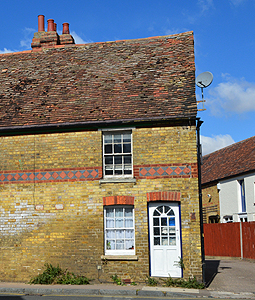
14 Sun Street August 2013